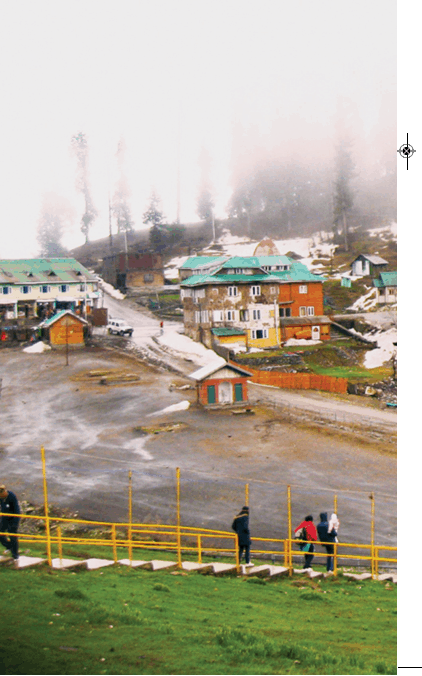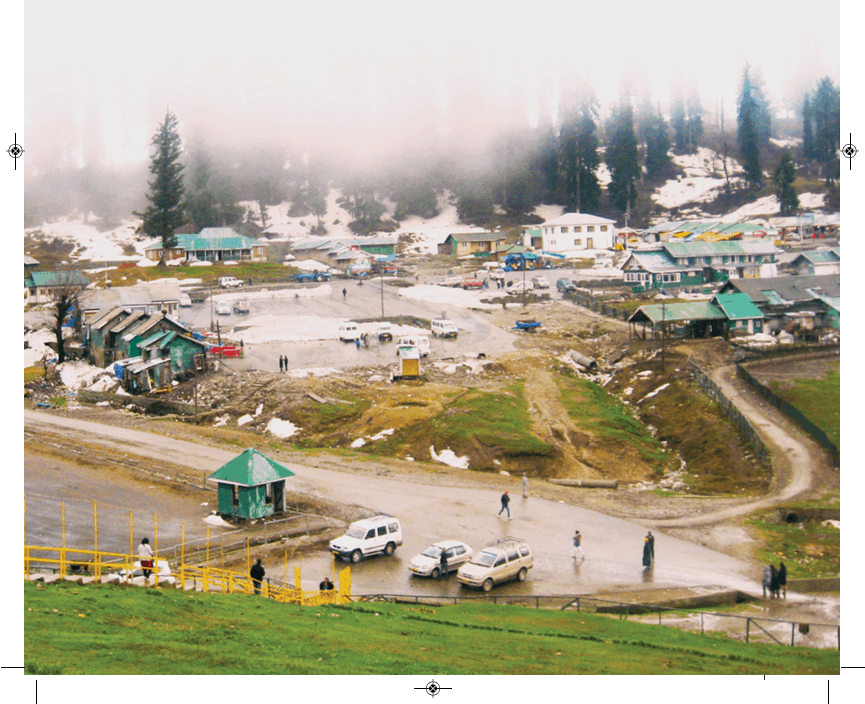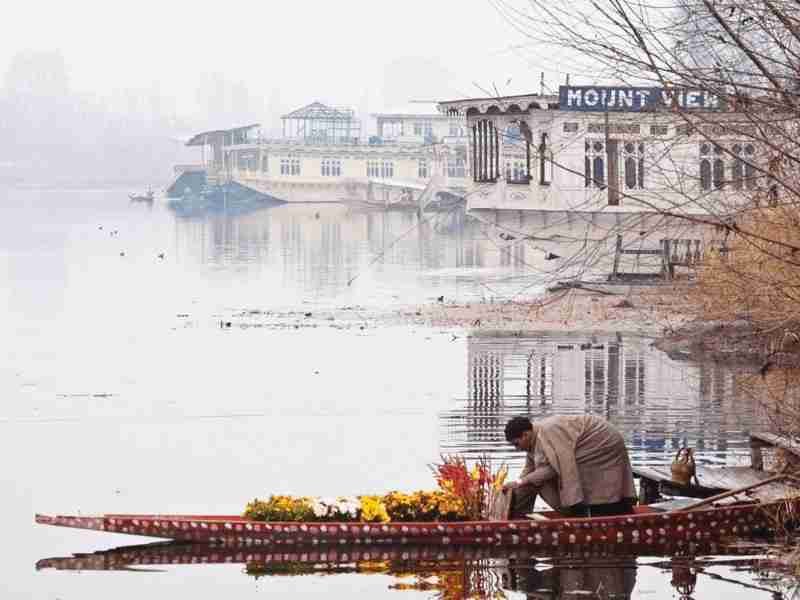I decided to go with a friend who has a family home in Srinagar, for a visit and talk to people about their fears and challenges. Arriving at the airport I was stunned to see hundreds of people that had come on different flights. The airport was buzzing with returning Hajis, tourists and Kashmiris. The flights into the city were full. Porters streamed around asking to collect our baggage. My friend had her favourite porter who gave us a big smile and took our baggage tickets while another friend of hers who was the manager of an airline greeted us and told me that he was from Kashmir and his wife was running a successful IVF clinic there with the latest equipment and I must see it. His mobile worked as he was with an airline.
I noticed that the road from the airport had changed considerably since my last visit seven years ago. There were several flyovers, which the driver told me had been completed in the last year and had made access to Gulmarg and Pahalgam easier; one now did not have to go through the city.The streets were lined with trees and stunning new homes built like Swiss chalets but much bigger. Our driver told us there was no shortage of food and all the hospitals were open and fully staffed. Junior schools had no attendance as people were scared to send young children to school. Scared of what I asked, “The militants who put up posters in areas telling people to not let their children go to school and shops not to open.”

He told us that just recently, a shopkeeper who always kept his shop open was shot by terrorists. Surprisingly, all pharmacies and medical shops were open and from 6 am to 8 am and from 6 pm to 8 pm the other shops were also open. We had arrived around noon. Seniors who were about to have exams went to school. There were cars and several trucks on the road taking apples to the plains, and people were moving around rather freely buying fruit and vegetables from vendors. Some vegetable and fruit shops had their shutters down but just outside their closed shops, they had put out all the produce for sales. They had cleverly skirted around the terror posters.
“Many people send their children to private schools,” our driver said, “As they don’t have faith in the government schools.” Just like Delhi, I told him. The schools are all English medium. He had nine-year-old twin daughters and a five-year-old son. They all went to private schools and had tuitions in the evening from teachers in the schools. I told him this seemed to be like double-dipping, and obviously, the teachers were making a lot of money.He laughed and said I was right but the class teacher would insist the kids needed tuitions.
Next, we went to the GB Pant Children’s hospital, started by a trust of the family of India’s famous minister Govind Ballabh Pant. My first stop was at the emergency ward which was full of parents with children.I asked the doctor if there was any shortage of medicines and she looked surprised. “Why would you think so” she said? I tell her I am visiting from Delhi and there were rumours going around that medicines were in short supply.
Next, I visit the wards. They are clean and well-kept and large windows keep it bright. I see a little boy sitting on a bed and writing away. His mother tells me, with the help of my driver as interpreter that he is four-years-old and has been in hospital with pneumonia.
Are the doctors good here and is he getting medication? I asked in Hindi. And she responded in Hindi, and said that the treatment was good and that her son would be leaving the hospital on the morrow. Another child around 12 years- old also has pneumonia and he was getting a nebuliser treatment. His mother seemed more worried and told me that he had not eaten for three days—just has a few spoons of food. I try and reassure her and tell her children with fever sometimes need time but keep him hydrated and let him eat his favourite foods. She seemed relieved and said that this is just what the doctor told her.
Next, we go to the X-ray rooms and the Ultra Sound areas; there are fewer parents here but everything is working. By now I have spoken to many parents outside the OPD, found out about their kids, questioned them on whether they have cooking gas at home and whether all their food requirements are available. They all say yes but are puzzled by my questions. Again, I tell them about the rumours.
Not all of them are from Srinagar as this is one of the best children’s hospital and they have been referred here from the district hospitals. Many have come from villages and small towns around the valley. I am amazed at the way they chat openly with me even though I am a total stranger. On my way out I see a passenger bus with big red crosses all over it. This caters to patients from outside town my driver tells me.
Next, I go to the biggest hospital in Srinagar, SMHS Hospital. Here there are lines to register for OPD at Rs 10. I see a big board printed in English which says, ‘This a Free Hospital’. Admission and treatment are free but when I visit the wards, the families complain to me that they give glucose free, but make them buy some medicines from the pharmacies and medical shops just outside the hospital. This has a familiar ring to it as I know of government hospitals all over the country that do this. While I am talking to one family, others gather around to tell me about their patients. Once again, I ask them about food supplies and cooking gas and once again all of them look at me puzzled as if I am trying to change the subject. I have to reassure them that I have come from Delhi and heard there was a shortage here. They smile and reassure me that it is not a problem. I think they feel happy about my concern. I decide to go to the Chief Medical Officer to ask about the medicines. A pretty lady greets me and tells me she is the CMO, I ask her if there is a shortage of life-saving drugs or medical supply in the hospital. She tells me that they are adequately supplied. I want to ask her why are the people in the wards complaining to me about being made to buy some of their medicines from the stores outside, but refrain as I don’t want the patients I have just seen and their families get into trouble.

When I ask my driver, he says this is usual. He has been here many times over the years with his relatives and sometimes they even have to pay for tests. I go back to the admissions counter and the guy there once again reassures me in front of my driver, that once admitted all medicines and tests are free for patients. The people in line behind me whisper to me, “Don’t believe him, it is not true, as for years we have been paying for some tests and medicines.”I say to them I am sure it will change now, just wait a while. What else can I say? I am in no position to change a system that has been going on for years.
Strangely one does not see any check posts. Near the airport, there are two. CRPF jawans and police are present but not in large numbers as one had expected. It does not seem like a city under a major security clampdown.
I headed to Residency Road, the area with expensive shops. They are all shuttered. It is around 4 pm. I ask my “all- knowing” driver, who has been born and brought up in Srinagar, why are they doing this? He says from the mainstream parties to the militants to the separatists—all have over ground workers that have brought the state to a halt many times. I see a half-shuttered shop selling Indian sweets and ask the driver to stop. A man outside the shop says I can buy sweets there. They open the shutter for me and my friend and we go in together. I expect to see empty shelves but the place is full of freshly made mouthwatering delicacies.
I order some Kalakand and barfies. I ask the owner, a polite young English-speaking guy in his mid-thirties if the shop is shut, who buys your sweets. He tells me they have enough orders.We end up speaking to him for an hour on Article 370. He is against what was done. Why I ask him? he says that Kashmir produces so much that it can be independent. He has a couple of businesses, has studied in the US and says most people are literate and have jobs. I tell him I see Kashmiri youth even in Goa trying to make two ends meet—selling clothes. Their parents have sent them out as they don’t want them to get involved in the problems that have been going on here for decades. He tells me that Kashmir has a very high per-capita income. He is open to suggestions, but coming from an affluent family, I feel he is out of touch with the joblessness that I see here.
He insists that most of the shops are closed because they want to show they are against the new law but at the same time, he admits this has happened many times before during 2010 and 2016. He seems a little confused but we debate back and forth, without any rancour. I point out how much the Centre has spent on J&K. I ask that if they were so self- sufficient, the state would be contributing to the GDP.
I can see he has no faith in dynastic politics but probably knows everyone involved. He says stone pelters are not paid but come out because they want to. The media has spoken to some who had been stone pelters I tell him and they honestly admit they are paid and that there are not enough jobs. Many apply for police and army jobs.
I realise the owners of the shops in Residency Road are part of the elite and they do business even while they have their shutters down, unlike the smaller kirana stores. The shop near my friend’s home is open all the time. Perhaps they are not afraid. We go in to buy groceries and they are really helpful. They are known to my friend and there seems to be no dearth of supplies.
In the evening people are glued to their televisions. There is no internet but landlines are working. People in the local government say that the internet was being used to create fear and chaos and should not be opened soon. One What’s App message or doctored video can cause havoc. As it is, so many false rumours are floating around.
Friends drop in to meet my friend. Some of them are doing very well in government jobs and tell me that the Valley will take time to settle down. My friend tells them that the residents of the homes around us pay no property tax and very few have electricity meters. It seems that many people have got used to not paying for electricity and taxes. In fact, one can see lines being pulled from poles everywhere. Governance has been lax for decades. Several areas that are prone to floods have huge homes built, which were once spill-off areas.
This is true of many cities, but Srinagar has no slums, as such, expect in the old city, which was the only place cordoned off. We saw it while driving around. This was Yasin Malik’s area, the driver told us. On another plush street, we saw The Residency Hotel that had been sealed off belonging to Yasin Malik. He did very well for himself as a separatist. He was sheltered and fawned over by all the local political parties even though hard evidence showed he had shot down four Air Force men. Finally, a case has been registered against him after 30 years.
Many should be brought to justice—we have been a soft state for too long, appeasing murderers who killed innocent people. But finally, there is hope that the victims will find justice.We drive past Mehbooba Mufti’s home. It is an estate, the walls of which go on for a mile or more. The PM of India has a tiny place by comparison. This is the kind of fiefdom that only existed during the time of the monarchies in India. The Abdullah’s have their own such residences, father and son live separately. Such is the wealth they have all accumulated with dynastic power.
The next few days were spent in talking to Shikara wallahs and vegetable vendors and shopkeepers. Their tourist season is nearly over. They get locals and some tourists in the evening hours. They charge us Rs 500 for half an hour but we are happy to give it as this tourist season has not been good. Our shikara wallah has a 10-year-old son, who is also out of school. His name is Salman and we tease him that he is going to be a big actor like Salman Khan. He smiles happily.
Our driver tells us that a new set of posters has appeared all over town telling people to stay at home or face death. Lashkar-e-Taiba terrorists have been caught trying to infiltrate into the valley. A truck full of arms and IEDs were found coming across the border from Pakistan.Rumours abound regarding the presence of terrorists in the valley. They will definitely try and strike somewhere in India. Pakistan cannot abide that J&K has slipped from their hands for good.
But in the valley people seem happy. Just going about their work as people do everywhere. It seems they are used to disruption and many say we feel safer now than we have for
decades. This is a good sign.
Freelance journalist Ashali Varma has authored the biography of her father late Lt. Gen. PS Bhagat — ‘The Victoria Cross: A Love Story’. She was executive producer with the International Commentary Service Inc, New York in 1990. She was the executive publisher of The Earth Times, New York (1992- 98). She has also worked as the editor of Choices Magazine, United Nations Development Programme. She writes on various issues including human rights, population and sustainable development. This article has been taken from two earlier published articles in the Times of India blog, No Free Lunch


